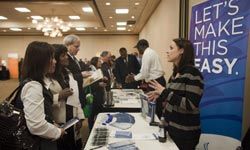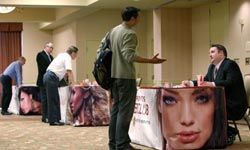Thank goodness, job prospects seem to be improving. As of February of 2012, the United States Department of Labor reported that the number of applicants for unemployment benefits dropped to the lowest point in four years. However, many people are still anxious about job security and others are still looking for work. And maybe you want to help them.
Career fairs can provide an ideal venue for employers and job seekers to come together to share job information, apply and interview for jobs. At these events, employers set up booths with displays of information about their company or organization, offering a highly efficient way to connect future employees with potential employers.
Advertisement
Additionally, career fairs can turn a profit for the hosts. For example, some career fairs charge exhibitors thousands of dollars for prime locations at the fairs. Others charge attendees an entrance fee too.
Although career fairs have the potential to set up job seekers with employers, in downward economies the value of the job fair has been called into question. Long lines, overcrowded venues, and disorganized set-ups can make some career fairs ineffective. On the other hand, a well-planned career fair can be a success for employees, employers and the host. Let's look at some ways to increase efficiency.




